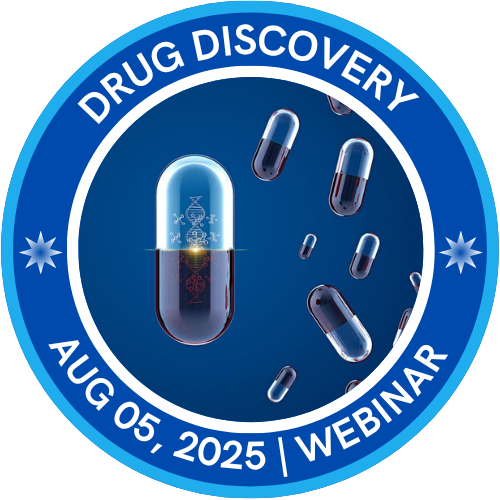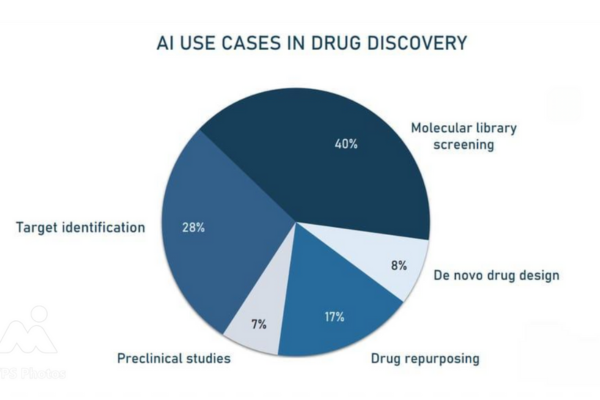Welcome to the Drug Discovery 2025 2nd Webinar, proudly hosted by Globalmeetx.
This event unites a global community of scientists, pharmaceutical professionals, researchers, and industry leaders to explore the forefront of innovation in drug discovery and development.
We are honored to host distinguished speakers and passionate participants who are pioneering advances in target identification, high-throughput screening, AI-driven drug design, and translational medicine. Your participation reflects a shared commitment to accelerating therapeutic breakthroughs, improving patient outcomes, and addressing the world's most pressing health challenges.
Let’s collaborate, share insights, and ignite new ideas as we drive the next generation of discoveries in pharmaceutical science.
Wishing you an inspiring, insightful, and impactful experience!

Looking to expand your knowledge in Drug Discovery and pharmaceutical innovation? Our virtual 2nd webinar offers an exclusive opportunity to learn from world-renowned experts, explore cutting-edge breakthroughs, and connect with fellow researchers and professionals from across the globe. Gain practical insights and stay ahead in the rapidly evolving world of therapeutic development.
Discover a wealth of knowledge as we dive into key topics such as target identification and validation, AI and machine learning in drug design, high-throughput screening technologies, pharmacokinetics and pharmacodynamics, regulatory and ethical considerations, and innovations in personalized and precision medicine. Participate in live presentations, dynamic Q&A sessions, and engaging panel discussions designed to equip you with the insights and tools to lead innovation in the future of drug discovery.
Drug discovery is a complex and multidisciplinary process that involves identifying new therapeutic agents to treat diseases. This track explores the foundational principles, including the drug discovery pipeline, biological targets, small molecules, biologics, and high-throughput screening methods. Understanding the fundamentals sets the stage for deeper insights into modern drug development approaches.
This track provides a comprehensive introduction to the entire drug discovery and development pipeline, from identifying disease targets to bringing a therapeutic product to market. It covers the historical evolution of drug discovery, key milestones in pharmaceutical innovation, and modern drug modalities such as small molecules, biologics, and gene therapies. Students will learn about the stages of discovery, preclinical development, clinical trials (Phases I-IV), regulatory approval processes, and the associated timelines, costs, and success rates. The course emphasizes the interdisciplinary nature of drug development and the collaboration required across biology, chemistry, pharmacology, and regulatory affairs.
This track focuses on the scientific principles underlying drug action and target selection. It begins with an exploration of receptor pharmacology, signal transduction pathways, and the classification of drug targets, including enzymes, GPCRs, ion channels, and nucleic acids. Emphasis is placed on understanding disease mechanisms at the molecular and cellular levels to identify and validate potential therapeutic targets. Students will learn various techniques used to assess target engagement and efficacy, such as RNA interference, CRISPR gene editing, and knockout animal models. Real-world case studies will illustrate the process of moving from a biological hypothesis to a validated drug target.
This track delves into the foundational chemistry that underpins successful drug design and optimization. Students will explore the principles of structure-activity relationships (SAR), functional group modifications, bioisosterism, and stereochemistry in drug molecules. The course addresses physicochemical properties like solubility, permeability, and lipophilicity, which impact a compound's pharmacokinetics and drug-likeness. Topics also include prodrug strategies, metabolic stability, and the role of chemical synthesis in iterative compound design. By the end of the course, students will be able to critically evaluate lead compounds and propose rational modifications to improve their biological activity and drug-like properties.
This track introduces computational tools and techniques used in the modern drug discovery process. Topics include molecular docking, homology modeling, quantitative structure-activity relationship (QSAR) modeling, and pharmacophore modeling. Students will gain hands-on experience with software platforms used for virtual screening of compound libraries, predicting binding affinities, and simulating molecular dynamics. The course also explores the integration of cheminformatics and bioinformatics in predicting ADMET properties and optimizing hit compounds. The use of AI and machine learning for de novo drug design, compound generation, and multi-objective optimization is also highlighted as a frontier in drug discovery.
This track provides a deep understanding of how drugs behave in the body (pharmacokinetics) and how they exert their effects (pharmacodynamics). It covers key concepts such as absorption, distribution, metabolism, and excretion (ADME), as well as dose-response relationships, therapeutic windows, and receptor binding dynamics. Students will learn how to design PK/PD studies, analyze time-concentration curves, and apply models to predict efficacy and toxicity. Emphasis is placed on translating in vitro data to in vivo systems and optimizing drug exposure to achieve desired therapeutic outcomes. The course includes case examples from both preclinical and clinical stages.
This track focuses on identifying and mitigating safety risks during drug development. Students will explore the types of toxicological assessments-acute, sub-chronic, and chronic toxicity-as well as genotoxicity, carcinogenicity, reproductive toxicity, and organ-specific toxicity. The course examines safety pharmacology studies required by regulatory bodies, including cardiovascular, respiratory, and central nervous system assessments. Students will understand how to interpret toxicological data, determine No Observed Adverse Effect Levels (NOAEL), and conduct risk-benefit analyses. Advanced topics include in silico and in vitro predictive toxicology, animal model selection, and emerging tools like organ-on-chip technologies.
This track outlines the global regulatory landscape that governs drug approval and commercialization. Students will learn about the roles of major regulatory bodies such as the FDA, EMA, and PMDA, and the documentation required for Investigational New Drug (IND) applications and New Drug Applications (NDA). The course also introduces the principles of Good Laboratory Practice (GLP), Good Manufacturing Practice (GMP), and Good Clinical Practice (GCP). In parallel, it covers intellectual property (IP) strategies, including patents, exclusivity rights, and freedom-to-operate analyses. Students will explore how regulatory science and IP management are critical for securing market access and protecting innovation.
This track explores how artificial intelligence and big data are revolutionizing drug discovery. Students will examine the use of machine learning algorithms in target identification, virtual screening, lead optimization, and predictive toxicology. The course covers deep learning, natural language processing for literature mining, and generative models for designing novel molecules. Emphasis is placed on the integration of large-scale biological datasets-such as genomics, transcriptomics, and proteomics-with chemical and clinical data to inform decision-making. Real-world examples and case studies will showcase how AI is accelerating timelines and improving success rates across the discovery pipeline.
This track introduces the concept of tailoring medical treatments based on individual genetic, environmental, and lifestyle factors. Students will learn about the use of biomarkers, pharmacogenomics, and companion diagnostics in stratifying patients and predicting therapeutic responses. The course explores applications in oncology, rare diseases, and autoimmune disorders, where patient-specific information can guide treatment choices. Topics include clinical trial design for personalized medicine, regulatory considerations, and challenges in implementing precision approaches in healthcare. Emerging technologies such as single-cell sequencing, liquid biopsies, and digital health tools are also discussed in the context of personalized treatment strategies.
Ensuring a drug reaches its target site effectively is essential for therapeutic outcomes. This track delves into novel delivery technologies, including transdermal systems, nanocarriers, biologic drug stabilization, and injectable sustained-release formulations. Strategies to overcome solubility, permeability, and stability challenges are highlighted.
Clinical trials are essential for evaluating the safety and efficacy of new drugs in humans. This track covers trial design, phases of clinical testing (Phase I-IV), patient recruitment, ethical considerations, and regulatory requirements. Special emphasis is placed on data collection, statistical analysis, and trial monitoring to ensure robust results.

Our webinars are thoughtfully designed to deliver value to a wide range of individuals. Whether you're looking to grow your skills, explore new opportunities or gain insights from experts, here's who will benefit most from attending:

In a world where knowledge is power, webinars have emerged as one of the most accessible and impactful ways to learn, grow and connect. Don't miss the chance to learn, grow and connect in ways that truly matter.

Registering for a webinar is essential to gain access to the unique opportunities and secure a chance to grow, connect and gain insights that can drive your personal and professional success. Webinars are more than just online meetings, they're gateways to knowledge, innovation, and growth.

The global drug discovery market is experiencing significant growth, driven by rising demand for novel therapeutics, technological advancements, and increasing prevalence of chronic and rare diseases. As of recent estimates, the market is valued at over $80 billion and is projected to surpass $140 billion by 2030, growing at a compound annual growth rate CAGR of approximately 7-9%. Key drivers include the expansion of biopharmaceutical R&D pipelines, the emergence of precision medicine, and breakthroughs in AI, machine learning, and high-throughput screening technologies. Regions such as North America and Europe dominate the market due to established pharmaceutical infrastructure and robust funding, while Asia-Pacific is witnessing rapid growth fueled by outsourcing, lower operational costs, and increasing government investments in healthcare innovation. Strategic partnerships between academia, biotech startups, and big pharma are accelerating discovery timelines, while the adoption of platform technologies such as CRISPR, PROTACs, and RNA-based therapeutics is reshaping the competitive landscape. However, challenges such as high attrition rates, regulatory hurdles, and escalating development costs continue to pressure profit margins and highlight the need for more efficient, data-driven discovery models.